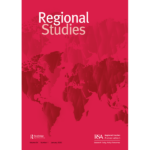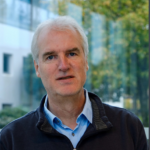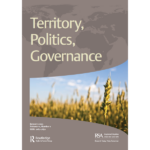2023 RSA Annual Conference Plenary Sessions and Speakers
For all information on the Plenary Sessions and Speakers for the RSA 2023 Annual Conference, please see below. To return to the main conference website click here.
Thursday 15th June 2023, 09.05 – 10.35 CEST
Opening Plenary: Green Global Value Chains for Sustainable Regional Development
As the globe transitions to net zero emissions, more goods and services will become inherently green. This will create new and different “Green” Global Value Chains (GGVCs) to bring these products and services from conception to end use (and beyond) across multiple countries in more sustainable ways. In turn, these changing forces altering local comparative advantage have the potential to affect the geography of GVCs and will likely modify the trade and FDI advantages of countries and regions. Thus, while the direction of change for regions and their policies is still difficult to see with clarity, the “greening” of GVCs needs to be carefully considered by regional policymakers in their pursuit for sustainable regional development.
Building upon the recent RSA Policy Impact Book “Harnessing Global Value Chains for Regional Development”, this plenary session will bring together latest academic evidence and public policy insights to discuss three main questions.
- Why will greening GVCs become an increasingly important area of study and discussion for sustainable investment and local development?
- How can policymakers best build, embed and reshape (or harness?) GGVCs for sustainable development thorough trade and FDI?
- Where are our knowledge gaps and how regional studies research can help to address them in innovative ways?

Riccardo Crescenzi is a Professor of Economic Geography at the London School of Economics. He has been a European Research Council (ERC) grant holder, leading a major five-year research project on foreign direct investment (FDI), global value chains (GVCs) and their territorial impacts across the globe. He is currently the LSE Principal Investigator of a large collaborative research project funded by Horizon Europe and UK Research and Innovation (UKRI) on inequalities in the era of global megatrends.
He is also an Editor of Regional Studies.
Riccardo has a long track-record of teaching and research in regional economic development, innovation, FDI and GVCs, and in the analysis and evaluation of public policies. This research is published in top peer-reviewed journals in economic geography, international economics and international business and management and widely cited in academic and policy circles. His most recent book “Harnessing Global Value Chains for Regional Development” (2023, Routledge) explores how regions, cities and clusters can build, embed and reshape global value chains for local enhancement

Anna is manager for the investment promotion mission and regional partner collaboration at Business Sweden, the Swedish Trade & Investment Council. She is an experienced professional in investment promotion and international business development holding various positions at Business Sweden (previously Invest in Sweden Agency which merged with the Swedish Trade Council) for over 15 years. Besides development and steering of the national investment promotion assignment, Anna is developing and coordinating partner, government and regional IPA collaboration and competence development to attract and facilitate FDI to Sweden. Other areas of expertise include development of Monitoring & Evaluation model.
Prior to joining the national investment promotion agency of Sweden Anna was in the venture capital industry for seven years working with business development, marketing and investor relations for a listed Swedish VC company investing in tech and ICT startups, supporting companies to scale up and grow internationally.

Marco Kamiya is Chief of the Division of Digital Transformation and Artificial Intelligence Strategies at UNIDO, the United Nations Industrial Development Organization. The Division works on frontier technologies, innovation ecosystems, and digital transformation applied to smart manufacturing, agribusinesses, energy and environment.
Marco Kamiya was the Chief of the Urban Economy and Finance Branch at UN-HABITAT in Nairobi, Kenya. Previously a senior officer at CAF Development Bank for Latin America in Caracas, and the Inter-American Development Bank in Washington DC. Earlier, as senior economist of PADECO Co., Ltd., in Tokyo, implemented projects globally funded by JICA and JBIC.
Some upcoming publications are “Digital Transformation and SDGs”, forthcoming UNDESA-UNIDO, a flagship report on productivity and digital trade UNESCAP-UNIDO-UNCTAD. Previously, “Economic Foundations for Sustainable Urbanization” (UN-Habitat), “Finance for City Leaders Handbook (2018, Co-edited UN-Habitat and University College London UCL), “Entrepreneurship and Development” (CAF 2013), and two chapters for the “Global Value Chain, Trade and Innovation” (UNECLAC 2013).
He speaks English, Japanese, Spanish and Portuguese, studied International Development at Harvard University (MPA-ID) and possesses a PhD in Economics.

Oliver Harman is a Cities Economist for the International Growth Centre’s (IGC) Cities that Work initiative based at the Blavatnik School of Government, University of Oxford and Associate Staff at the London School of Economics.
Oliver is also a Clarendon Scholar studying the financing of Sustainable Urban Development in low-income and fast-growing cities. In these roles, he attempts to help bridge the gap between research and policy translating economic literature into clear urban policy guidance for emerging country city governments.

Sandrine Kergroach is Head of SME and Entrepreneurship Performance, Policies and Mainstreaming at the OECD Centre for Entrepreneurship, SMEs, Regions and Cities (CFE).
She leads CFE work on innovation and internationalisation, and the conditions that could enable SMEs and start-ups to scale up and drive a more sustainable, resilient and inclusive growth. She supervises the development of monitoring and anticipatory infrastructure, including the “OECD SME and Entrepreneurship Outlook” and a Data lake on SMEs and Entrepreneurship. She also leads efforts for mainstreaming the SME&E policy agenda. Her recent publications include the “Digital Transformation of SMEs”, “Financing Growth and Turning Data into Business”, and a new series on “Strengthening FDI-SME Linkages”.
Prior to joining CFE, Sandrine worked at the OECD Directorate for Science, Technology and Innovation on issues related to policy monitoring, measurement and foresight.
She holds a Doctorate in Economics (TU Berlin), a Master in public and corporate policy and strategy, and a Master in applied economics and statistics (Paris Dauphine-PSL), and a Master in modern history (Paris Sorbonne).
Friday 16th June 2023, 08.45 – 10.15 CEST
Plenary 2 – Finance and Space: Sustainable Financing and Unsustainable Debt

The global imperative of sustainability in finance is colliding with the unsustainable debt that has accumulated over the past decades of ‘cheap money’. We clearly need a rapid and just transition to renewable energy and a decarbonized society and economy, while attending to the European Green Deal’s broader aim that “no person and no place [will be] left behind”. However, current geopolitical upheavals and global macro-economic outlook do not seem conducive to giving necessary importance to sustainable principles, which in turn affects our chances of moving towards a more sustainable economy and society. This plenary session, featuring three distinguished experts in conversation and employing examples from around the world, addresses the following questions:
1. How can we ‘shrink’ finance and turn too much (bad) debt turn into finance for social good?
2. How can we tackle household over-indebtedness together with the climate crisis and the negative impacts these are both having on people’s and places’ health and well-being?
3. How can we redesign and redefine (financial) relationships between places that (re)produce inequalities in resources, power and wealth?
Finance and Space is a new journal by the Regional Studies Association (RSA) and the Global Network on Financial Geography (FinGeo). The journal is published online only with articles published as soon as they emerge from the review and production process. Finance and Space aims to publish and promote state-of-the-art research on diverse aspects of the spatial production of finance and the financial production of space. As such, it will address some of the most profound processes and pressing challenges of our times, including digitization, neoliberalization, financialization, globalization and deglobalization, uneven development, inequality and lack of diversity, (in)security and geopolitics, the environmental crisis, and the role of finance in building more sustainable economies.
Finance and Space will publish contributions to theory, methodology, empirical studies, as well as research relevant to strategy and policymaking. It will promote a global coverage and diversity of research both in terms of authors and the subject matter. While dedicated to a geographical imagination, the journal is founded on the belief that advancing our understanding of the changing finance-space nexus requires an interdisciplinary approach and heterodox thinking. This includes, but is not limited to, political economy and political science, economics and regional science, sociology, anthropology, housing studies, environmental studies, financial history, development studies, and urban and regional planning, in addition to geography, regional studies, and urban studies. For enquiries on the journal, please contact Dariusz Wójcik (dariusz.wojcik@spc.ox.ac.uk), Karen Lai (karen.lai@durham.ac.uk) or Sally Hardy (sally.hardy@regionalstudies.org).
The journal will be part of the Meet the Editors Session I held on Thursday, 15th June 2023, 14.00-15.30.

Professor Katherine Brickell joined the Department of Geography as Professor of Urban Studies in January 2023. She was previously Professor of Human Geography at Royal Holloway, University of London. As Principal Investigator Katherine has just completed two UKRI GCRF grants, the first focused on better understanding the under-researched links between household debt, climate change, and health (https://www.debt-climate-health.org) and the second centred on tracing the impacts of the COVID19 pandemic on garment workers (https://www.refashionstudy.org). Previous research on the relationship between modern slavery and climate change (www.projectbloodbricks.org) won the Times Higher Education Research Project of the Year: Arts, Humanities and Social Sciences in 2020.
Katherine’s work more broadly is feminist-oriented and seeks to understand gendered experiences of precarious home and working lives. Her latest monograph Home SOS: Gender, Violence and Survival in Crisis Ordinary Cambodia (Wiley 2020) has been awarded the 2023 Social and Cultural Geography Journal book prize. She is also the Editor of the journal Gender, Place and Culture.
Katherine’s current research funded by the Urban Studies Foundation is engaging with homeless families living in temporary accommodation as they try to cope with and navigate rent-arrears and private debt preceding and during the COVID-19 pandemic. Working in partnership with the Shared Health foundation, it aims to have national policy and public impact in the UK through its contribution to the All Party Parliamentary Group (APPG) on ending homelessness and new APPG specifically on households in temporary accommodation.
Presentation: Microfinance, over-indebtedness and climate adaptation
Household over-indebtedness needs to be tackled in tandem with the climate crisis and the negative impacts these are both having on people’s health and well-being. This is the argument of the plenary, evidenced through mixed method data and artist-intervention in Cambodia (and India) from 2019-2022 funded by UKRI GCRF. Microfinance borrowing has become an inescapable aspect of farming in a changing climate. Yet the ‘Depleted by Debt?’ study shows that rather than resolving a short-term shock, microcredit is being incorporated into already stressed and vulnerable livelihoods, undermining long-term coping and, as a result, adaptive capacity in many cases. Indebtedness, in turn, becomes over-indebtedness as borrowers face adverse consequences as the price of their financialised resilience. The plenary therefore offers cautionary evidence on microfinance for climate adaptation.

Dr Vincent Guermond is a Leverhulme Early Career Research Fellow in the Department of Geography at Royal Holloway, University of London. His research interests are in the areas of the geographies of debt, finance and market making, climate adaptation, migration and development, and social reproduction. Vincent is lead author of the UKRI GCRF report (2022) Microfinance, Over-Indebtedness and Climate Adaptation: New Evidence from Rural Cambodia. He has published in leading academic journals in geography, development studies, and international political economy, including Progress in Human Geography, Geoforum, Environment and Planning A, Review in International Political Economy, World Development, and Development and Change. His new book Remittances and Financial Inclusion: Contested Geographies of Marketisation in Senegal and Ghana is forthcoming with Routledge. This follows from his doctoral research which was awarded the 2020 Global Network on Financial Geography Doctoral Dissertation Prize.
Presentation: Microfinance, over-indebtedness and climate adaptation
Household over-indebtedness needs to be tackled in tandem with the climate crisis and the negative impacts these are both having on people’s health and well-being. This is the argument of the plenary, evidenced through mixed method data and artist-intervention in Cambodia (and India) from 2019-2022 funded by UKRI GCRF. Microfinance borrowing has become an inescapable aspect of farming in a changing climate. Yet the ‘Depleted by Debt?’ study shows that rather than resolving a short-term shock, microcredit is being incorporated into already stressed and vulnerable livelihoods, undermining long-term coping and, as a result, adaptive capacity in many cases. Indebtedness, in turn, becomes over-indebtedness as borrowers face adverse consequences as the price of their financialised resilience. The plenary therefore offers cautionary evidence on microfinance for climate adaptation.

My research develops three related themes under the umbrella of critical macro-finance.
First, I am interested in shadow banking activities, in particular repo markets, and the implications for monetary theory, central banking, sovereign bond markets and regulatory activity. My two research projects are Managing Shadow Money (funded by INET) and the Capital Markets Union (funded by FEPS).
In 2016, I was invited as expert witness at the European Parliament’s public hearing on the Capital Markets Union. You can find my remarks here
Second, my research develops the theme of transnational banks’ involvement in policy deliberations around capital controls and crisis management in both global settings and in emerging markets. Finally, I research the IMF’s conditionality and advice on capital controls.
Presentation: Derisking the Green Transition: A Critical Macrofinance Take
The Green Transition, including the new appetite for green industrial policies, puts derisking at the core of new state-private capital partnerships. A critical macrofinance lens suggests that a) derisking aspires to replicate the price mechanism of a competitive order without disciplining the private recipients of fiscal, monetary and regulatory subsidies, which in turn amplifies a disorderly expansion of capital and consumes fiscal space for the alternative of transformative public investment; b) in social infrastructure, derisking worsens distributive outcomes and obstructs just transitions, and c) derisking entrenches neocolonial patterns of unequal ecological exchange and subordination, enabling resource transfers both directly via commodities trade and via capital flows.

Sabine Dörry is a Senior Research Fellow at the Luxembourg Institute of Socio-Economic Research (LISER) and an Adjunct Associate Professor at the University of Luxembourg. She was previously a GSO Leadership Fellow and held a Marie Curie Research Fellowship at the University of Oxford (2013-2015). Sabine is a board member of the FINGEO Network, the Global Network on Financial Geography, where she is also editor for the network’s working paper series. Sabine is also an editor of Articulo – Journal of Urban Research.
Friday 16th June 2023, 13.15 – 14.45 CEST
Plenary 3 – The Regional Studies Plenary: Global Production Networks meets Evolutionary Economic Geography: What Common Ground can the Two Theories find and what are the Implications for Regional Studies

Theoretical development in regional studies has been dominated by two economic geography framings. The first, global production networks (GPNs), sees regional development as an exogenous process, shaped by strategic coupling configurations of lead firms and their networks. The second, evolutionary economic geography (EEG), focuses on related variety as key to a region’s ability to break out of stagnancy by diversifying to new branches of knowledge. Differences in the two theories may be traced to their regional origin: whereas developing regions in East Asia are deeply integrated to lead firms’ production networks and global value chains, EEG scholarship is rooted in the more advanced regions of Europe where innovation and technological capability is relatively high. The exogenous-endogenous divide however is artificial. This plenary will bring together two prominent scholars to discuss ways in which GPN and EEG may be complemented (see also, Rodriguez-Pose, 2021). The session hopes to move the debate forward in an exchange between scholars and discussants that has relevant implications for regional studies.
Regional Studies is a leading international journal covering the development of theories and concepts, empirical analysis and policy debate in the field of regional studies. The journal publishes original research spanning the economic, social, political and environmental dimensions of urban and regional (subnational) change. The distinctive purpose of Regional Studies is to connect insights across intellectual disciplines in a systematic and grounded way to understand how and why regions and cities evolve. It publishes research that distils how economic and political processes and outcomes are contingent upon regional and local circumstances. The journal is a pluralist forum, which showcases diverse perspectives and analytical techniques.
Essential criteria for papers to be accepted for Regional Studies are that they make a substantive contribution to scholarly debates, are sub-national in focus, conceptually well-informed, empirically grounded and methodologically sound. Submissions are also expected to engage with wider debates that advance the field of regional studies and are of interest to readers of the journal. The journal features the following sections:
Urban and Regional Horizons is a periodic section dedicated to agenda-setting work that stimulates new thinking and novel approaches to addressing the big intellectual questions, issues and challenges in regional studies.
Policy Debates is a periodic section that provides a forum for analysis and debate about important policy issues of international relevance in urban and regional development.
Book Reviews provide analysis and comment on key recent publications in regional studies.
For more details on the journal, go to www.tandfonline.com/journals/cres20.
The journal will be part of the Meet the Editors Session I held on Thursday, 15th June 2023, 14.00-15.30.

A Brief Biography: At 11 years old, I left my birthplace Guangzhou, China, and emigrated with my family to Hong Kong in 1979. After seven years of secondary education in Hong Kong’s Diocesan Boys’ School (O-Level Class of 1986 and A-Level 1988), I came to Singapore in July 1988 to pursue my higher education and future life. I graduated with B.A. First Class Honours in Geography from the National University of Singapore in July 1992. I then obtained my Ph.D, under the supervision of Professor Peter Dicken, from the School of Geography, University of Manchester in England in 1995 and returned to start my career at the Department of Geography, National University of Singapore. I was Senior Tutor (1992-1995), Lecturer (1996-1998), Assistant Professor (1998-1999), and Associate Professor (2000-2005). Since July 2005, I have been Professor of Economic Geography. Since February 2018, I have been appointed Distinguished Professor of the National University of Singapore in recognition of my “outstanding academic excellence as well as academic and intellectual leadership”

Ron Boschma is currently Full Professor in Regional Economics at the Department of Human Geography and Planning of Utrecht University. He is also Professor in Innovation Studies at UiS Business School of Stavanger University in Norway. He has been Full Professor in Innovation Studies at Lund University, Sweden, 2013-2017, where he was also director of the Centre for Innovation, Research and Competence in the Learning Economy (CIRCLE).
Boschma is member of the High-level Expert Group ‘S3 Community of Practice’ of the European Commission DG REGIO 2023-2025, and he has been member of the Scientific Advisory Group of the European Commission DG Regional and Urban Policy 2018-2020. He is member of the Board of the International Regional Studies Association since 2015. He was member of the Research, Innovation and Science Experts (RISE) High-Level Advisory Body to the European Commissioner Carlos Moedas in DG Research and Innovation in 2015-2016. He has done numerous research projects for the World Bank, the European Commission, European Science Foundation, OECD, the National Government of Italy, and for many Ministries in the Netherlands, among others.
Boschma, together with other scholars, has laid the foundations of Evolutionary Economic Geography, an influential stream in Economic Geography. He has published in international journals on regional diversification, Smart Specialization policy, geography of innovation, regional resilience, spatial evolution of industries, structure and evolution of spatial networks, and on the relationship between agglomeration externalities and regional growth. Boschma has been ranked by Thomson Reuters among the top 1% of cited researchers worldwide in all scientific fields since 2014 on a yearly basis.
Presentation Summary
The research agendas of evolutionary economic geography (EEG) and global value chains (GVCs) have developed more or less independently from each other, with little interaction so far. This is unfortunate because both streams of literature have a lot to offer each other. My presentation will explore how. I will identify promising crossovers between the EEG and the GVC literatures, but also some missing links that need to be taken up in future research. These new research avenues, with the aim of promoting the adoption of an evolutionary perspective on GVCs, are expected to enrich both literatures in mutual ways.

Jessie P.H. Poon is Professor of Geography at the University at Buffalo, New York. She is currently an editor of Environment and Planning A. She was the North American editor of Papers in Regional Science from 2002 to 2006. She has published over 100 papers on multinational firms’ locational strategies, foreign direct investment, trade, and technological upgrading dynamics in Asia.

Lisa’s research interests include knowledge economy, innovation, and technological change; innovation systems, clusters, and industrial districts; regional development and competitiveness. In parallel, I have always been concerned with the role of the government and institutions including innovation and industrial policies and EU regional and cohesion policy.

Neil Lee is a Professor of Economic Geography at the LSE. He is also Professor II at the Inland Norway University of Applied Sciences and theme convenor at the LSE’s International Inequalities Institute. His research has been funded by international and private sector organisations including the World Bank, OECD, the EIB, and Barclays Bank, and cited in key UK government documents such as the UK Levelling Up White Paper. He has held visiting positions at Columbia University, Science Po, and the University of Oxford and holds affiliations with the University of St Andrews and Nuffield College, Oxford. He is Principal Investigator on a major international ESRC project on regional inequality across the advanced world.
Saturday 17th June 2023, 10.45 – 12.15 CEST
Closing Plenary
Territory Politics Governance Annual Lecture: What does a more Sustainable Future Require? Strengthening Cooperation, Improving Governance and Understanding the Politics of Systemic Change

European Union considers itself a leader in the field of sustainability transition. The Green Deal is a package of initiatives designed to catalyse the ambition to achieve Net Zero by 2050. However, the implementation of these initiatives is not straightforward. This Territory, Politics, Governance Annual Lecture plenary session considers what will be required and identifies three areas that deserve close attention in the coming years:
- the nature of co-operation within the Union of 27 member states;
- the need to improve the underpinning governance of sustainability futures and
- the impact of systemic change, which includes dealing with the fall-out of the EU’s parlous relationship with Russia and more competitive co-existence with China and the United States.
The speaker, Dr Janez Potočnik, an economist and diplomat from Slovenia with extensive knowledge and experience of the EU and its institutions, is an ideal guide for those seeking to better understand challenges and prospects for a more sustainable future – and a fitting tribute to the subject matter of Territory Politics Governance.
Territory, Politics, Governance is an interdisciplinary journal from the Regional Studies Association. It is committed to the development of theory and research in territorial politics and the governance of space. The journal creates a platform on which to explore the interface between territory, politics, economy, identity and the organisation of political space. It confronts topical and emergent issues of world economic and political concern. The journal publishes original, high quality international scholarship from this growing, international and increasingly vibrant field directed at a worldwide academic audience and at policy makers, activists and other communities of practice.
The journal is indexed in Clarivate Analytics’ Social Sciences Citation Index and Scopus and has a significant circulation footprint as it is distributed with its sister journals, Regional Studies, Spatial Economic Analysis and Area Development and Policy. It is essential reading for academics and practitioners alike. For more details on the journal, go to www.tandfonline.com/journals/rtep20.
The journal will be part of the Meet the Editors Session I held on Thursday, 15th June 2023, 14.00-15.30.

Alexander L. Q. Chen is a postdoctoral researcher at the Department of Social Sciences and Business, Roskilde University. He was awarded his Ph.D. in 2022 from the Department of Sociology, University of Copenhagen, based on his research on the spatial division(s) of labor between China’s coastal and inland regions. His current research participates in the “Governing the Green Transition” (GOGREEN) project, which involves a comparative analysis of 32 local and regional case studies worldwide on co-created green transitions. The project aims to establish the necessary and sufficient governance factors to facilitate successfully co-created green transitions based on a qualitative comparative analysis of the 32 case studies. To this end, he is involved in the execution of five regional case studies in Denmark and Indonesia, addressing a plurality of sustainability issues such as mangrove conservation, nature parks, sustainable student housing, and residential energy communities.
Presentation: Co-creating regional and sustainable futures
The emergence of the C40 city network has foregrounded cities and regions as sites of major sustainability transformations. Cities and regions have in the process thereof also become agents of change, as their participation in the green transition has increasingly been organized around the governance principle of co-creation referring to a form of collaborative governance under which public authorities work in close collaboration with local citizens, private companies, non-governmental organizations, and other civil society organizations to identify perceived public challenges and consequently, through collective agency, identify solutions and joint solutions. These incipient trends can be viewed as a paradigmatic shift in public governance paradigms towards so-called New Public Governance, which views the public sector as a “platform and arena for co-creation” (Ansell & Torfing, 2021a, p. 11) based on networked relations, cross-sectoral partnerships, and collaborative governance. The presentation offers preliminary insights on the mainstreaming of co-creation, based on the global project “Governing the Green Transition” (GOGREEN) consisting of 32 case studies around the world. The mainstreaming of co-creation has wide-reaching implications for regional studies scholars, as it holds the latent promise to (a) renew democratic processes through the empowerment of local communities and other concerned stakeholders in governance and decision-making processes, and (b) unlock innovative and creative problem-solving methods by involving a broader range of societal stakeholders in local and regional planning.

Dr Janez Potočnik was born in 1958. He graduated with honours from the Faculty of Economics at the University of Ljubljana. He continued his studies at the same university where he did his master’s degree in 1989 and a Ph.D. degree in 1993.
For several years (1989-1993), he worked as a researcher at the Institute of Economic Research in Ljubljana. In July 1994, he was appointed Director of the Institute of Macroeconomic Analysis and Development of the Republic of Slovenia. In April 1998, the Government of the Republic of Slovenia appointed Dr Potočnik Head of Negotiating Team for Accession of the Republic of Slovenia to the European Union. From June-December 2000, he was also the acting director of Government Office for European Affairs. In June 2001, he was appointed a Minister Councillor at the Office of the Prime Minister. On 24 January 2002, the Government of the Republic of Slovenia appointed him as the Minister without portfolio responsible for European Affairs.
Presentation: What does a more Sustainable Future Require? Strengthening Cooperation, Improving Governance and Understanding the Politics of Systemic Change
For the first time in a human history we face the emergence of a single, tightly coupled human social-ecological system of planetary scope. We are more interconnected and interdependent than ever. Our individual and collective responsibility has enormously increased. Cooperation is a must, as well as improved governance to enable it.
Access to, use and benefits based on exploitation of natural resources have been in the human history always closely related to the level of the achieved wellbeing, but also to stability, security, conflicts, wars etc. Current economy is not leading to sustainable future. What is needed is to apply the system change logic and approach and address the main drivers currently leading to a “charming mass suicide”.

Virginie Mamadouh is Associate Professor of Political and cultural geography at the Department of Geography, Planning and International Development Studies (GPIO) of the University of Amsterdam (UvA).
Research
Her research interests pertain to diverse aspects of political and cultural geography and can be grouped around the following themes
- electoral geography and representations, (urban) social movements and collective actions
- geopolitics and globalisation, (de)territorialisation and (de)bordering processes and more specifically supranationalism and the (multilevel) governance in the European Union, and the role of cities and city networks in European and global politics.
- geopolitical representations and national and other territorial identities, languages and territories , citizenship, multilingualism, migration and new media”
- institutional transplantation and policy transfer, gridgroup analysis, Cultural Theory, theory of sociocultural viability
- history of political geography and geopolitics
She recently contributed to the FP7 research programme Mobility and Inclusion in Multilingual Europe (MIME) https://www.mime-project.org/

Professor Klaus Dodds is Executive Dean for the School of Life Sciences and Environment at Royal Holloway and Co-Director of the Living Sustainably research catalyst (with Professor Redell Olsen). He is a Visiting Professor at the College of Europe, Warsaw Poland.
He researches in the areas of geopolitics and security, ice studies and the international governance of the Antarctic and the Arctic.